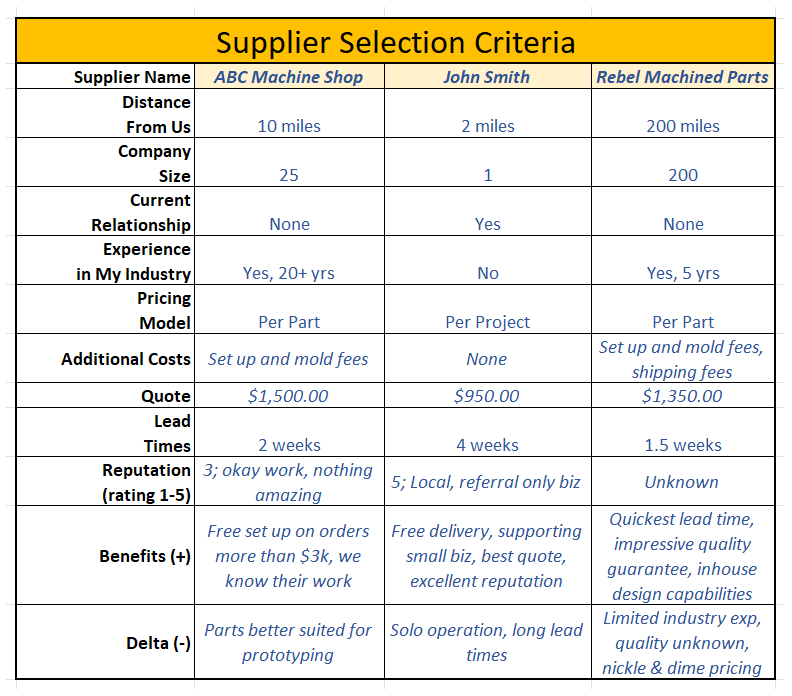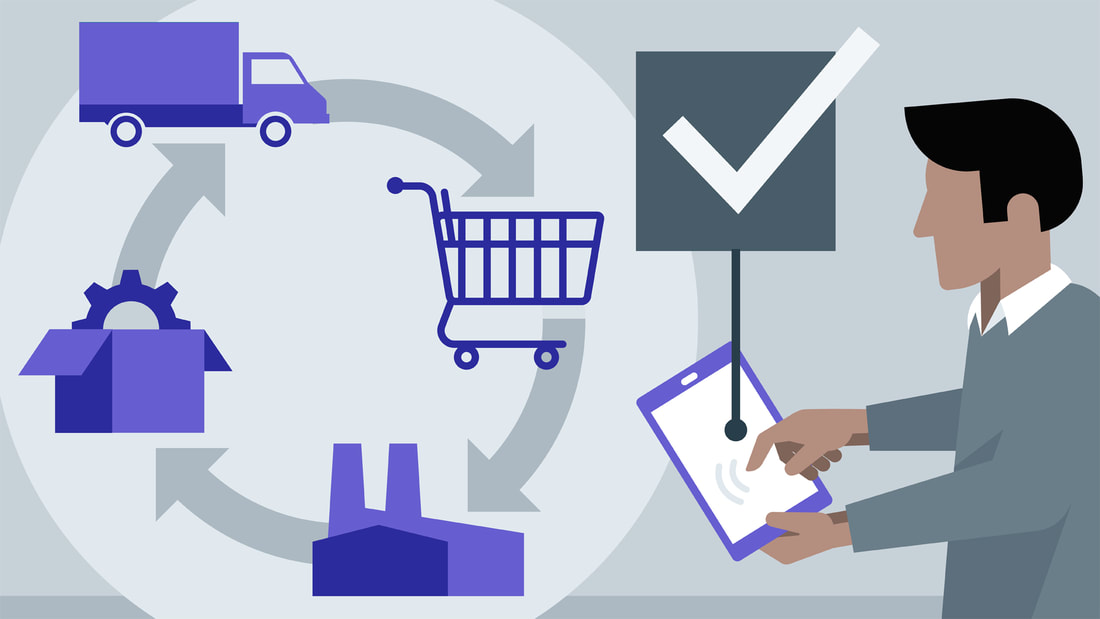|
We’ve had an unprecedented amount of commentary and feedback on the original article published in early 2018 covering ‘Picking the Right Supplier’. Given the current economic and supply chain challenges facing many businesses in 2022 we’ve updated the article to reflect today’s business needs in an ever-changing marketplace. When you need help in your business how do you figure out where to go to find it? Just as important, how do you make sure the help you select is the right one for the job? The supplier selection process (finding and picking your help) is an important and vital step for any size company. Making the wrong decision can lead to countless hours of wasted time and of course money down the drain. To find the right supplier, a ‘supplier selection process’ is important to develop ahead of time, especially for small and start-up based business where decisions can have a larger impact on the state of the business. When looking for a new supplier follow these steps to best position yourself and company for success in picking the right relationship for your business: 1. Know What You Need Before You Need It Two reasons this is important: 1st – if you don’t know what you need how will you be able to explain it to a supplier? If you can’t explain it how will they understand what you need to then be able to successfully deliver on your behalf? When we know what we need, and therefore want, we're better prepared to explain those needs while setting expectations for what a successful partnership looks like. This minimizes miscommunication and opportunity for expectations to fall through. 2nd - Waiting till the last minute to find suppliers often leads to decisions being made which may get you out of a momentary jam but leads to larger problems down the road. For this reason it’s vital you are proactive in establishing relationships with vendors and suppliers before you actually need their help. 2. Finding A Supplier Referrals, referrals, referrals! Once you know what you need the best approach to finding the right supplier is by reaching out to others in your industry, or local industry associations, to learn who they use, and just as important who they don’t use. Take the time to read reviews, gather intel from people you trust before you start calling potential suppliers. While sites like Thomasnet and Google can provide this information it is likely you will quickly find yourself overwhelmed with information. In the end the most useful data is those that are unbiased or comes from experience which is best collected from trusted resources. Me personally, I would rather work with someone I know, or with someone a close source to me knows, rather than cross my fingers and hope for the best by using an online search. As stated in #1, do the leg work to find suppliers proactively before you actually need it! 3. Be A Detective, Collect Useful Information It's vital you vet all potential suppliers with the same list of needs, criteria, and expectations this way you can compare each supplier and what they bring to the table. This will help to create an even playing field when looking at a supplier’s capabilities, offering and of course pricing. Below shows an example of what a ‘Supplier Selection Criteria' may look like. Using this type of tool allows you to collect similar information while comparing against other options. It’s important to remove emotion from this process while sticking to facts. Remember – each situation may be different. There may be a time you need something quickly, in this situation ‘quick response’ usually translates to higher cost. Maybe location of your supplier or their experience in your industry is important. Each situation is different and should be viewed as so in order for you to determine what supplier is best fit for your needs. 4. Strategic Thinking & Economies of Scale Once you know what you need from a supplier it’s important to think about other associated or cross functional activities which need to be done that could be accomplished by a single supplier. The ideal situation is you find a supplier that can do more than just one component of your needs, therefore providing more value in the long run. This also saves time because you have less suppliers and vendors to managed increasing your efficiency and effectiveness. Lastly, its not uncommon when you have one supplier doing several things for you to experience a price break as a result. The flip side may also be true – if you have one supplier dominating a particular part of your business that can also be a risk point as well. Balance is key here while consistently reviewing your relationships, needs and financial output annually. 5. Proactively Learn About Your Suppliers Behaviors When speaking with a potential new supplier try connecting with the people you will be working with, not just the company’s salesperson. This is important because once the relationship is established most of your time won’t typically be spent with their salespeople rather those delivering the service or product. When courting a supplier pay attention to things like:
6. Economics & Supply Chain Simply put - can your supplier withstand a downturn in the economy? Do they have a strategy in place for dealing with supply chain issues? I love working with small companies because I think it’s important to support small businesses, however I do often think about their ability to weather the storm from a business continuity perspective. Regardless of the size of the supplier, what is more important is can they continue to meet your needs even when times get tough. If they are a critical supplier to your business it’s worth spending time to learn about this proactively as you don’t want to find yourself in a situation where the economy takes a digger causing your supplier to go belly up or unable to meet its commitments. Your supplier’s inability to manage their business may just leaving you high and dry, in the process causing you to have your own business continuity issues. In the end, the supplier selection process should ideally come down to three things, in ranked order: 1. Performance 2. Relationship 3. Price At the end of the day it doesn’t matter how affordable or cost effective a supplier is, or how nice they are as people. If they can’t perform, and do so consistently, the other two ultimately don’t matter. I’ve also found that paying a bit more for the right service and relationship often is worth the investment it in the long run despite the extra cost up front. As Benjamin Franklin is quote as saying, “The bitterness of poor quality remains long after the sweetness of low price is forgotten.”
0 Comments
Executive Summary: Developing a strategic and consistent process to evaluate and therefore acquire suppliers before you need them is vital to our ability in growing our company. When we utilize a systematic process we eliminate bias and emotion from the decision making process which allows us to make decisions which are capabilities and needs based rather than emotions. Your ‘minimum expectations’ list serves as a road map for decision making and comparison shopping as you engage with each supplier. Author: Travis Smith Read the full article by downloading the below PDF attachment
When we look at a how most businesses operate we learn there is a consistent and heavy reliance on external parties to help the organization operate effectively. The larger the business the more reliance they typically have on external people and or companies to help them achieve their goals.
For start up businesses it’s common to see them rely on external service companies and consultants which provide support in areas such as finance, accounting, HR, logistics, even sales. If you’re a product based company your supply chain inevitably includes people or companies which provide product support such as design, prototyping, packaging, raw materials/ components, etc. Many of us rely on our suppliers to help us run our business efficiently, but are we truly maximizing these partnerships? Lot’s of small company’s use ADP to process their payroll. ADP is considered the gold standard in payroll processing as they offer their service across a broad range of business sizes and industries, provide a thorough and well-crafted service which is customizable and affordable. For many small businesses it’s a no brainer to use ADP for payroll processing because ADP does it far more effective and at a cheaper cost than most small businesses could do on their own. Here’s the catch – did you know ADP also offers support in talent acquisition tools, benefits administration, HR services (including outsourcing/ PEO), employee system integrations and even marketplace apps? I didn’t! I always thought of ADP as a payroll provider, little did I know that ADP also offers at least five other major services, all of which carry the same ADP quality of service and support. This is where we fall short in utilizing our suppliers to maximize the impact on our business. If we don’t know all of the services or areas of support our suppliers offer we can’t align those services with our business needs. Last year a start up medical device client of ours came to us with a problem. They needed to do some concept feasibility research on a particular product idea they had which if it made it to market it would significantly aide them in completing against their two closest competitors. They contacted our company not to help them with the project, but to help them with a referral to a local Orange County, CA based company that specialized in designing and testing early stage concepts. Damn it! That was a hard pill to swallow. My company, through yours truly, had been working with this start-up for several years and this client, who we had a good relationship with, didn’t know all of the services we could and do provide. That was an invaluable learning lesson. I had assumed all along that our client knew we also provided concept design and small stage prototype testing. I was wrong. As the old saying goes “when we assume we make an ass out of you and me.” That saying should be re-written to say “when we assume we make an ass out of me and me only.” After I listened to our customers situation and the support they were looking for it was apparent we would be a great option for them. The conversation thereafter was rather amusing and equally humbling as our customer told us “oh really, I had no idea you also offered that service. We would love to work with you all on the project, you already know our system, product lines and the people running the project. How do we get started?” I remember hanging up the phone and laughing to myself thinking, “how many other customers do we have that think of us in one way yet have no idea about the other services we provide.” The next several months after this realization I spent all my efforts educating our current customer base on our full suite of services, not just the one area of support our customers had grown to rely on us for. It would prove to be a valuable learning lesson on my end needless to say. Seven months later we finished the concept feasibility project, three weeks ahead of schedule, for the customer I had mentioned earlier. At the completion of the project I asked our customers VP R&D for his feedback on the project, our involvement, our work output and of course “would he use us again for other development needs they had?” His response, “you all did a great job. We honestly had no idea you did concept work. We would rather give the work to an existing supplier, like you, we trust than go out and start a new relationship with someone we have no history with. Interestingly enough, after we learned that about your firm and the other services you offer which we didn’t know about we went back to several other key suppliers and ask them for information on other services they offered. In one instance we ended up saving almost 19% on our annualized material costs because we shifted the majority of our material purchasing needs over to another existing supplier. We love working with them and their prices were very competitive, we just had no idea they offered other materials outside of what we were already purchasing from them.” Yahtzee! Here in lies the ‘Ah-Ha’ moment and perhaps the reason you’re reading this article in the first place. Inevitably you are working with suppliers at present which you only have a narrow view of how they can help your business. Take a moment to reach out to those suppliers of yours and learn about their full suite of services and or capabilities. You may just find out there’s a handsome cost or time savings for you just around the corner. Key Take Away: Don’t assume you know everything about your supply base. Most likely you’re working with suppliers you don’t have a full understanding of their capabilities. Take the time to learn more about your supply base and how those existing relationships can further maximize the impact they’re making on your business. Action Item: Reach out to your best or favorite top 5 suppliers for the sole purpose of learning about their full suite of services and capabilities. Identify where you are presently working with them and the areas you aren’t. Does this supplier offer additional services that you could benefit from? Better yet, do they offer a service which you presently have contracted with another company you aren’t thrilled with? This is a great time to begin reviewing your supply chain to see if there are areas of your business that would be positively impacted by working with the suppliers you like working with? When you begin to ‘bundle’ more projects and opportunities with your supply base you stand to greatly reduce your time and cost associated with your supply chain. How to Pick the Right Supplier1/12/2018 The supplier selection process is an important and vital step for any size company. Making the wrong decision leads to countless hours of wasted time and of course money down the drain. A successful supplier selection process is even more important for small and start-up based business where financial considerations are at the top of the pecking order. When looking for a new supplier follow these steps to best position yourself and company for success: 1.Know What You Need Before You Need It Two reasons this is important: 1st – if you don’t know what you need how will you be able to explain it to a supplier? When we know what we need and therefore want we're better prepared to explain those needs while setting expectations for what a successful partnership and outcome looks like. This minimizes miscommunication and opportunity for expectations falling through. 2nd - Waiting till the last minute to find suppliers often leads to decisions being made which may get you out of a momentary jam but leads to larger problems down the road. For this reason it’s vital you are proactive in establishing relationships with vendors and suppliers. 2.Establish Minimum Expectations for Vetting Suppliers Establishing minimum expectations means that you will vet all potential suppliers with the same list of needs, criteria and expectations. This will help to create an even playing field when vetting suppliers and their capabilities. Similar to #1, when you know what you want and have created a way to gather information which allows you to do equal comparisons your chance of making the right decision increases dramatically. If need to create a checklist to hold yourself accountable to making the right decisions then by all means do so. 3.Be Strategic Once you know what you need from a supplier it is important to think about other associated or cross functional activities which need to be done that could be accomplished by a single supplier. The ideal situation is you find a supplier that can do more than just one component of your needs, therefore providing more value in the long run. This also saves time because you have less suppliers and vendors to managed increasing your efficiency and effectiveness. 4.Supplier Identification Referrals, referrals, referrals. Once you know what you need the best approach to finding the right supplier is by reaching out to others in your industry, or industry associations, to learn who they use, and just as important who they don’t use. Take the time to read reviews, gather intel from people you trust before you start calling potential suppliers. While sites like Thomas.net and Google can provide this information it is likely you will quickly find yourself overwhelmed with information. In the end the most useful data is those that are unbiased or comes from experience which is best collected from trusted resources. 5.Outreach and Selection When speaking for the first time with a potential new supplier try to connect with the people you will actually be working with, not just the company’s sales person. This is important because once the relationship is established the majority of your time won’t be spent with their sales people rather those delivering the service or product. What is their communication like? Do they respond quickly and address mistakes immediately? What is their customer retention rate? Find out how long their employees have been with the company too. If the company suffers from consistent turnover that should be a big red flag as you will likely have to be much more involved with this supplier helping coach and direct new employees to ensure the work is done properly. You don't want to be in a situation where you're training your suppliers new employees just so they can turn around and bill you for it. Also, where are you in the pecking order of the level of importance to the supplier? Don’t be fooled, not all clients are treated equal, even if they tell you otherwise. When you know where you stand it is easier to build a relationship based on realistic expectations. In the end, supplier selection should come down to three things, in ranked order:
At the end of the day it doesn’t matter how affordable or cost effective a supplier is, or how nice they are as people. If they can’t perform, and do so consistently, the other two don’t matter. I’ve also found that paying a bit more for the right service and relationship often times is worth the investment it in the long run. About the AuthorTravis Smith is the founder and managing director of Square-1 Engineering, a medical device consulting firm, providing end to end engineering and compliance services. He successfully served the life sciences marketplace in SoCal for over 15 years and has been recognized as a ‘40 Under 40’ honoree by the Greater Irvine Chamber of Commerce as a top leader in Orange County, CA. Categories
All
Archives
April 2024
|
||||||
Visit Square-1's
|
|







 RSS Feed
RSS Feed


